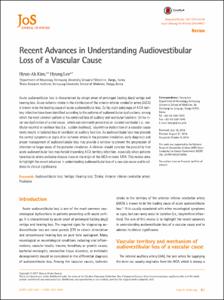Recent Advances in Understanding Audiovestibular Loss of a Vascular Cause
- Keimyung Author(s)
- Kim, Hyun Ah; Lee, Hyung
- Journal Title
- Journal of Stroke
- Issued Date
- 2017
- Volume
- 19
- Issue
- 1
- Keyword
- Audiovestibular loss; Vertigo; Hearing loss; Stroke; Anterior inferior cerebellar artery; Prodrome
- Abstract
- Acute audiovestibular loss is characterized by abrupt onset of prolonged (lasting days) vertigo and hearing loss. Acute ischemic stroke in the distribution of the anterior inferior cerebellar artery (AICA) is known to be the leading cause of acute audiovestibular loss. So far, eight subgroups of AICA territory infarction have been identified according to the patterns of audiovestibular dysfunctions, among which the most common pattern is the combined loss of auditory and vestibular functions. Unlike inner ear dysfunction of a viral cause, which can commonly present as an isolated vestibular (i.e., vestibular neuritis) or cochlear loss (i.e., sudden deafness), labyrinthine dysfunction of a vascular cause rarely results in isolated loss of vestibular or auditory function. As audiovestibular loss may precede the central symptoms or signs of an ischemic stroke in the posterior circulation, early diagnosis and proper management of audiovestiubular loss may provide a window to prevent the progression of infarction to larger areas of the posterior circulation. A clinician should consider the possibility that acute audiovestibular loss may herald impending AICA territory infarction, especially when patients have basilar artery occlusive disease close to the origin of the AICA on brain MRA. This review aims to highlight the recent advances in understanding audiovestibular loss of a vascular cause and to address its clinical significance.
- Publisher
- School of Medicine
- Citation
- Hyun-Ah Kim and Hyung Lee. (2017). Recent Advances in Understanding Audiovestibular Loss of a Vascular Cause. Journal of Stroke, 19(1), 61–66. doi: 10.5853/jos.2016.00857
- Type
- Article
- ISSN
- 2287-6391
- Appears in Collections:
- 3. Research Institutues (연구소) > Brain Research Institute (뇌연구소)
1. School of Medicine (의과대학) > Dept. of Neurology (신경과학)
- 파일 목록
-
-
Download
 oak-2017-0258.pdf
기타 데이터 / 285.07 kB / Adobe PDF
oak-2017-0258.pdf
기타 데이터 / 285.07 kB / Adobe PDF
-
Items in Repository are protected by copyright, with all rights reserved, unless otherwise indicated.